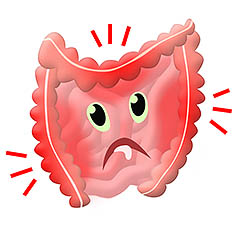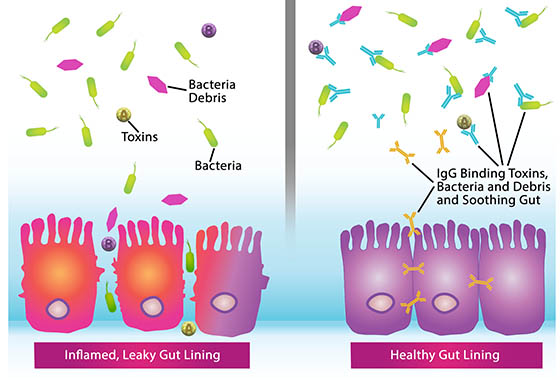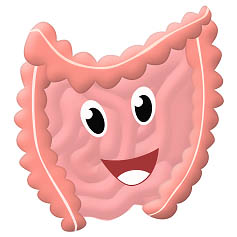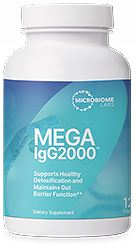 C. difficile toxins A and B are responsible for the brunt of the terrible symptoms associated with C. difficile gut overgrowths. Did you know there’s a simple way you can get symptom relief? It’s by binding up and removing these toxins from the colon, so you can quench the fire of C. diff symptoms and re-establish proper bacterial balance in your gut. Read on to discover this over-looked but simple way to get symptom relief.
C. difficile toxins A and B are responsible for the brunt of the terrible symptoms associated with C. difficile gut overgrowths. Did you know there’s a simple way you can get symptom relief? It’s by binding up and removing these toxins from the colon, so you can quench the fire of C. diff symptoms and re-establish proper bacterial balance in your gut. Read on to discover this over-looked but simple way to get symptom relief.
Where Does IgG Come From?
Immunoglobulins are natural proteins that your body makes to fend off infections and disease. These beneficial proteins neutralize toxins and soothe gut tissues through their binding and anti-inflammatory properties.
 Like humans, cows also make immunoglobulins that can bolster your immune system when consumed as a supplement. Bovine immunoglobulins are a highly potent and precise infection-fighting remedy.
Like humans, cows also make immunoglobulins that can bolster your immune system when consumed as a supplement. Bovine immunoglobulins are a highly potent and precise infection-fighting remedy.
Immunoglobulin G (IgG) is made from food grade, USDA approved edible plasma derived from cows. Through special processing, plasma components and impurities are removed and the purified product is spray-dried into a powder to form a potent and easy to use supplement.
How Does IgG Work?
Disease causing bacteria produce a variety of highly toxic compounds. Toxin A and B produced by C. difficile are two examples of bacterial enterotoxins and cytotoxins. When C. diff bacteria over-populate the gut, they produce more of these toxins. C. diff Toxin A and B are responsible for the worst symptoms of C. difficile infections including: colitis, diarrhea, antibiotic-associated diarrhea and pseudomembranous colitis.
Cattle are naturally exposed to numerous bacteria in the environment, including Staph, E. coli, Salmonella and C. difficile. Cattle build up a natural immunity to all of the toxins associated with these bacteria by making immunoglobulins, which bind to and neutralize the toxins. Immunoglobulins also bind to viral and fungal toxins.
 However, IgG does more than bind to toxins. The proteins in IgG aid gut healing by reducing permeability, inflammation and cytokine levels in the colon [1]. The same proteins improve nutrient absorption in the gut through increased D-xylose excretion and improved nitrogen retention [2].
However, IgG does more than bind to toxins. The proteins in IgG aid gut healing by reducing permeability, inflammation and cytokine levels in the colon [1]. The same proteins improve nutrient absorption in the gut through increased D-xylose excretion and improved nitrogen retention [2].
Unlike conventional toxin binders that can’t be taken with food or other supplements, IgG only targets disease causing compounds and leaves other molecules alone. So IgG can be taken at the same time as probiotics, foods and other supplements. Because IgG is highly targeted, it has no effect on the growth of healthy bacteria in the gut.
How Can IgG Help You?
 Binding the toxins secreted by disease-causing bacteria in the gut allows your immune system to remove them from your body, reducing the debilitating symptoms caused by these toxins. IgG also helps maintain the gut’s mucosal layer, which is a protective mechanism against toxins. And reducing inflammation inside the gut further relieves symptoms of C. difficile.
Binding the toxins secreted by disease-causing bacteria in the gut allows your immune system to remove them from your body, reducing the debilitating symptoms caused by these toxins. IgG also helps maintain the gut’s mucosal layer, which is a protective mechanism against toxins. And reducing inflammation inside the gut further relieves symptoms of C. difficile.
One of the biggest challenges with C. diff. is it’s superbug properties. Like other so-called superbugs, C. difficile if often difficult to treat with antibiotic drugs. Antibiotics that worked just a few years ago, such as Flagyl (aka metronidazole), are no longer effective due to the growing problem of antibiotic resistance. As C. difficile changes over time, new types develop that have more severe symptoms and are harder to treat.
Rather than attacking bacteria directly, IgG binds them and attacks the toxins created by the bacteria that cause the symptoms. Therefore, IgG is not prone to the problem of resistance that plagues antibiotic drugs. What’s more, IgG can bind to components of cell wall deficient “stealth” bacterial biofilms which are untreatable using antibiotics.
Amazing Benefits of IgG
- IgG and has been shown to bind and neutralize C. diff. toxins A and B in laboratory studies [3].
- Studies also show that IgG binds and neutralizes toxins from several different types of C. difficile, including recently discovered highly virulent ribotypes [4].
- Beyond the laboratory, human patients with recurrent C. difficile reported normal bowel movements and the ability to return to work after taking IgG [5].
- One particular patient with over 10 years of chronic colitis and C. difficile experienced intestinal healing and resolution of her symptoms after using IgG combined with other treatments [6].
- Similar results were reported in another patient with severe diarrhea who contracted C. diff. after taking antibiotics [7].
- Supports healthy intestinal barrier function and integrity.
- It helps restore gut homeostasis and optimal inflammatory balance.
- Can be used during antibiotic therapy or with antimicrobial remedies.
IgG does not bind to beneficial microbes, vitamins or minerals and does not need to be taken separately from food, medications or supplements.
Unique Benefits of ImmunoLin IgG
 I started taking a type of IgG called ImmunoLin several months ago and immediately noticed positive results. In the past, eating foods that contained even the smallest amount of mold would make me feel sick. But taking IgG immediately afterward quickly reduced the symptoms of mold sensitivity. In addition to relieving mold symptoms, ImmunoLin also improved my overall mood and reduced the symptoms of detox that I experience after taking certain foods and supplements.
I started taking a type of IgG called ImmunoLin several months ago and immediately noticed positive results. In the past, eating foods that contained even the smallest amount of mold would make me feel sick. But taking IgG immediately afterward quickly reduced the symptoms of mold sensitivity. In addition to relieving mold symptoms, ImmunoLin also improved my overall mood and reduced the symptoms of detox that I experience after taking certain foods and supplements.

Unlike milk-derived colostrum IgG products that contain 5-40% IgG, ImmunoLin is more potent with greater than 50% IgG. ImmunoLin is free from casein, whey, lactose and even endotoxin contamination, whereas other IgG products may not be. ImmunoLin is made under FDA current good manufacturing practices (cGMPs), which is more stringent than the typical dietary supplement manufacturing process.
We provide C. diff. specific usage guides and ongoing support for our product customers. Get Michelle’s favorite ImmunoLin soothing product from her supplement store today: Michelle’s Recommended IgG Toxin Binder

About the Author – Michelle Moore, BSc
Michelle Moore is a microbiologist, holistic health educator, and author of C. difficile Treatments & Remedies. With over 10 years of experience in pharmaceutical research and over 20 years in natural medicine, she helps people overcome C. difficile and other chronic infections naturally.
References
- Detzel CJ, Horgan A, Henderson AL, et al. Bovine immunoglobulin/protein isolate binds pro-inflammatory bacterial compounds and prevents immune activation in an intestinal co-culture model. PLoS One. 2015;10(4):e0120278.
- BW Petschow, B Burnett, AL Shaw, et al. Serum-derived bovine immunoglobulin/protein isolate: postulated mechanism of action for management of enteropathy. Clin Exp Gastroenterol. 2014; 7: 181–190.
- A Henderson, et al. Serum-Derived Bovine Immunoglobulin/Protein Isolate Enhances Overall Survival of Clostridium difficile Infection Accentuated by Malnutrition. Presented at Crohn’s & Colitis Foundation’s Clinical & Research Conference, December 4 – 6, 2014.
- A Henderson, et al. Serum-Derived Bovine Immunoglobulin/Protein Isolate Binds and Neutralizes Clostridium Difficile Toxins A and B. Presented at Digestive Disease Week, May 3-6, 2014.
- Carl Crawford, Raymond Panas. Post-Infectious Irritable Bowel Syndrome with Functional Diarrhea Following C. difficile Infections: Case Studies of Responses Using Serum-Derived Bovine Immunoglobulin. Journal of GHR 2015 April 21 4(4): 1577-1581.
- B. Beauerle, et al. Successful management of refractory ulcerative colitis with orally administered serum-derived bovine immunoglobulin therapy. Clin Case Rep Rev, 2015 doi: 10.15761/CCRR.1000130, Volume 1(4): 90-92.
- S. Ferm, et al. Serum-Derived Bovine Immunoglobulin as Novel Adjunct in Complicated Clostridium difficile Colitis Treatment. ACG Case Rep J 2017;4:e64. doi:10.14309/crj.2017.64.


 Fill in the form below to get our C. diff. tips newsletter and your free report “10 Things You Need to Know to Overcome C. difficile”.
We value your Privacy. Your email will be kept strictly confidential & secured. See our
Fill in the form below to get our C. diff. tips newsletter and your free report “10 Things You Need to Know to Overcome C. difficile”.
We value your Privacy. Your email will be kept strictly confidential & secured. See our 
